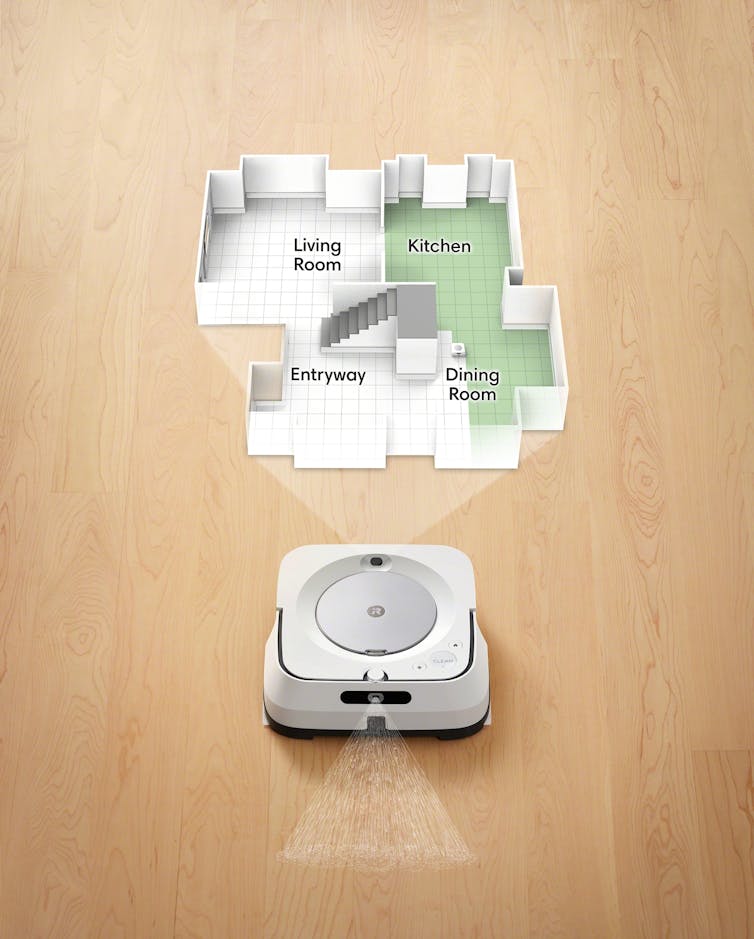Less than two weeks after the announcement of its acquisition of US healthcare company One Medical, Amazon is continuing its expansion with a US$1.7 billion offer for iRobot, the manufacturer of Roomba automated vacuum cleaners.
The acquisition will bolster Amazon’s line of smart home products and add to the retail giant’s vast store of consumer data. The move also raises a number of questions.
Why is Amazon doing this? Should we, as consumers, be concerned? What will Amazon do with yet another product that generates large volumes of data about its users?
What has happened?
The purchase seems like a natural fit for Amazon’s apparent plan to conquer the home. The tech giant already has a foothold in houses around the world, through the Alexa voice assistant system and products such as Echo smart speakers, Ring surveillance cameras, and drones.
Amazon already produces a “home monitoring” robot called Astro, although it is only sold “by invitation”.
However, the purchase of iRobot may be less about products and more about data. That US$1.7 billion price tag may seem a lot, but Amazon gains not only iRobot’s trove of consumer data, but also access to its existing fleet of constantly scanning robots.
iRobot agreed to be acquired by Amazon for $1.7 billion, according to a joint statement by the two companies. If the deal goes through, it would give Amazon access to yet another wellspring of personal data: interior maps of Roomba owners’ homes. https://t.co/uK4o2BhUFr
— WIRED (@WIRED) August 5, 2022
Mapping our homes
Roombas gather a particular kind of data about customers – or, to be precise, about their homes. While the original robot vacuum cleaners bumbled around, avoiding obstacles as best they could, the latest models map users’ homes in great detail.
This is great if you want your vacuum cleaner to autonomously clean your house and avoid falling down the stairs – but it raises a number of privacy concerns.

What about privacy?
A vacuum cleaner storing the layout of your home is not of great concern in itself – it simply makes it more efficient. But when the map data are stored in the cloud, we lose some control over them.
At present, Roomba maps are, in theory, only accessible by iRobot. But under Amazon’s ownership, we can’t be sure who will have access to the data or how the data will be used.
When asked about the potential use and storage of map data, an Amazon spokesperson noted that the deal hasn’t yet been closed with iRobot, so they do not have the details to share.
They added that the company doesn’t sell customer data to third parties or use customer data for purposes to which customers haven’t consented.
In the recent One Medical takeover, Amazon made very clear that medical data would be “handled separately from all other Amazon businesses as required by law”. However, it added:
Amazon will never share One Medical customers’ personal health information outside of One Medical for advertising or marketing purposes of other Amazon products and services without clear permission from the customer.
“Clear permission” sounds good, but in practice consumers routinely give “permission” to all kinds of activities explained only in lengthy and rarely read terms and conditions. In practice, this means permission is often ill-informed.
So it should come as no surprise if Roomba users are one day asked to agree to an update to the terms and conditions in which they grant permission for Amazon to use their in-home location data to enable greater optimisation of products and services. In essence, to sell more stuff, or make other products work “better”.
The future?
While Roomba owners are unlikely to see any significant change in the coming months, it is very likely they will soon have updated user agreements hitting their email inboxes and apps.
While these will initially simply reflect the change in ownership and associated legal responsibilities, at some point we may also see data sharing requests.

Where could this take us? Well, smart homes might actually becomes a little bit smart (yes, there are some positives).
If Roomba integrates with in-home cameras, for instance, it might automatically detect and clean up spills. Using location data, the Roomba could make sure it finishes cleaning before its owner arrives home from work.
Even home security systems could use future Roomba devices with cameras as a sentry. (It’s probably for the best that iRobot sold off its military division in 2016.)
While gun-toting robots are probably not on the Amazon product road map just yet, the Roomba maps may give the company an even more detailed view of customers.
Where is all this going?
With smart speakers and cameras already listening and watching, vast amounts of consumer purchasing behaviour monitored through its website and partners, and security systems integrated into our homes, Amazon already knows a lot about us.
In a Black Mirror-style extrapolation of the tech giant’s recent moves, you can imagine a future where Amazon health insurance (discounted for Prime subscribers, naturally) uses Ring cameras and Roomba to study your living conditions and behaviour patterns, and suggest interventions and set prices accordingly.
Amazon Care (this already exists) might inform you that it knows you haven’t taken a recommended trip to the gym because you’ve been at home all day. Or perhaps it’s a question of diet – and the ever-dutiful Amazon Robot Mower has reported a pile of empty pizza boxes and beer bottles outside by the bins.

For now, this is just a fantasy – but Amazon is in possession of most of the technology and data to make it reality.![]()
This article is republished from The Conversation under a Creative Commons license. Read the original article.
Credit: Source link


Comments are closed.